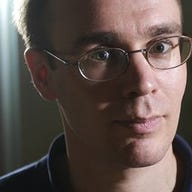Kevin Kelly looks to the next 5,000 days of the Web

Like most of us at Talis, I'm a big fan of the TED videos. There's always a wow moment lurking in each of these recordings, and many of them do a great job of challenging assumptions. More often than not, they're also powerful examples of how best to convey new ideas in presentation form.
Amongst the videos highlighted in the latest email alert from the TED team was this one, recorded at the Entertainment Gathering last December, in which Kevin Kelly notes that the Web is a mere 5,000 days old... and asks how we can predict what the next 5,000 will bring.
Mal Booth clearly got the same email, and was also impressed.
Kevin begins by looking back, reminding us about the extent to which things have changed in the past 5,000 days. He suggests that we could not have anticipated the services that have arisen, or the economic models by which they are supported.
He postulates the emergence of a global machine, more reliable than any other we have ever built. Within that machine, he suggests, we come together to navigate some 55 trillion links between documents, making 100 billion clicks per day and sending 2 million emails every second (most of which seem to arrive in my inbox!) As Tim Berners-Lee did in Beijing, Kelly draws parallels between the size of the Web and the size of the human brain. Kelly suggests that the size of the Web is doubling every year, such that the 'total processing power... in raw bits' of the Web will surpass that of humanity by 2040.
So how does this fit with the Semantic Web?
One of three broad trends that Kelly predicts for the next 5,000 days is a restructuring of the Web; a restructuring that Kelly argues is the Semantic Web.
He points to a progression from the pre-web linking of computers, to the web's linking of pages, and on to the Semantic Web and the linking of the data lying behind pages and applications wherever they may be.
"You have to be open to having your data shared... which is a much bigger step than just sharing your web pages or your computer."
"The next 5,000 days; it's not going to be [just] the Web, only better."
Worth 20 minutes of your time, to watch this...
